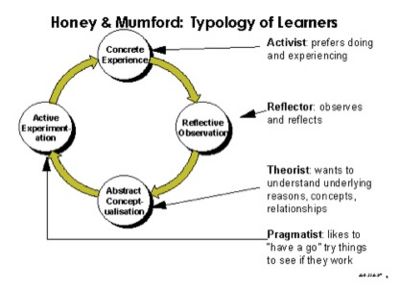Learner Centred Learning/Adult Learning Theories, Principles and Practices/Honey and Mumford’s Learning Cycle
From WikiEducator
Honey and Mumford’s Learning Styles

Diagram from James Atherton, 2009 Please go to the original site for a clearer view and more information
Developed from Kolb’s Learning Cycle, Peter Honey and Alan Mumford have identified 4 main learning styles.
- Activist (from concrete observation)
- Pragmatist (from active experimentation)
- Reflector (from reflective observation)
- Theorist (from abstract conceptualisation)
Key Features include:
- Activists respond most positively to situations offering challenge, to include new experiences and problems, excitement and freedom in their learning
- Reflectors respond most positively to structured learning activities where they are provided with time to observe, reflect and think, and allowed to work in a detailed manner.
- Theorists respond well to logical, rational structure and clear aims, where they are given time for methodical exploration and opportunities to question and stretch their intellect.
- Pragmatists respond most positively to practically-based, immediately relevant learning activities, which allow scope for practice and using theory.
It is anticipated that the preferred learning style of any individual will include elements from two or more of these four categories.
- (Fry, Ketteridge & Marshall, 1999, p 31)
As with Neil Fleming’s VARK model, Honey and Mumford have devised a questionnaire to help identify an individual’s learning style preferences.
For more reading on Honey and Mumford’s Learning Styles try the links below:
http://www2.le.ac.uk/offices/careers/pgrd/resources/teaching/theories/honey-mumford
http://www.mftrou.com/honey-mumford.html
http://www.bouchami.com/news.htm
http://www.learningandteaching.info/learning/experience.htm